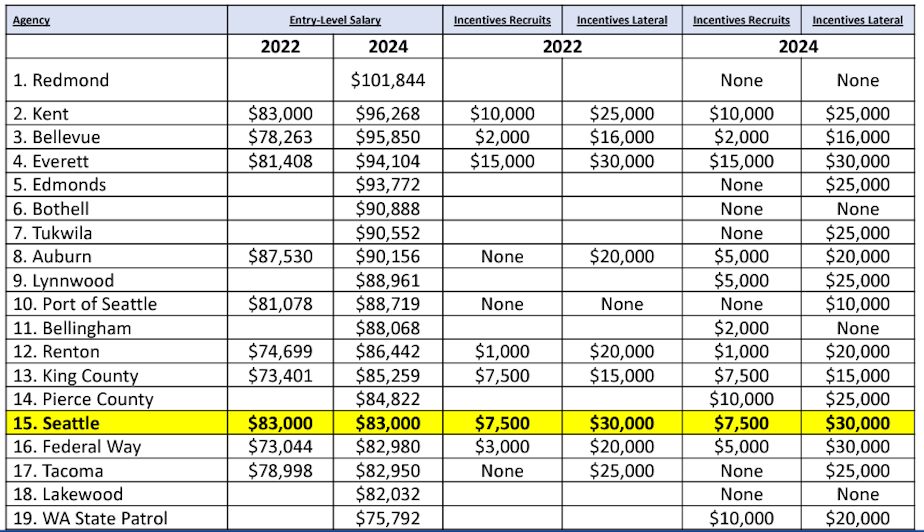Higher salaries? Subsidized housing? What will it take for Seattle to recruit and retain more police?

Facing staffing shortages, Seattle Police gave an update on officer recruitment and retention to the City Council’s Public Safety Committee on Tuesday. Police say they’ve lost hundreds of officers in recent years despite extensive recruiting and advertising.
“We've lost 725 officers over the last five years," Seattle Police Chief Adrian Diaz told council members. "That is over half the department that has gone.”
Diaz acknowledged that his department has hired "quite a few officers" in recent years, but they are still down to about 913 officers — the lowest level of police staffing since the 90s.
Diaz and other Seattle Police leaders gave an update on the hiring plan that Mayor Bruce Harrell announced almost two years ago.
Despite hiring a recruitment team, going to job fairs, hosting hiring events, and developing a marketing strategy with videos and advertisements, the department still can’t hire enough officers.
RELATED: Seattle Police faces reckoning over 'culture' in 2024 as federal oversight winds down
The number one reason that officers gave for leaving the force is inadequate pay, according to police. Starting salaries for entry-level officers in Seattle are less than those in Everett, Bellingham, Auburn, and Renton, according to city data.

To attract more people to apply for a job in Seattle, council members threw out various incentive ideas to Diaz and the others.
“Do any jurisdictions offer subsidized housing?” asked Council President Sara Nelson.
Autumn Manning, a recruiter hired by the city, said she was aware of subsidized housing programs in cities like Los Angeles and Baltimore.
Councilmember Rob Saka agreed with the idea of housing police to improve retention and recruitment.
"It's a good, worthwhile goal to get as many officers in particular to live here in Seattle or as close to Seattle as possible,” Saka said.
It isn’t clear right now how the Council might pay for housing police as the city faces a $230 million deficit and housing crisis.
Child care and take-home cars for some officers were also discussed by the panel.
Seattle’s lack of robust incentives is the reason why recruiters can’t get people to come to Seattle, they say.
“That's really challenging,” Manning said. “It is hard sometimes as a recruiter to continually say, ‘No, we don't have that, no we don't have that, no we don't have that.'”
Diaz also suggested there is room to free up some current officers who are under investigation for excessive use of force.
"The big issues, they'll still go to the OPA [Office of Police Accountability] and that still won't change. But we're looking at trying to figure out how do we streamline our use of force reporting mechanism. We're not rolling back our consent decree stuff, but how do we actually streamline it so that way it makes it much easier so our officers can get back in the streets quicker,” he said.
RELATED: From 'unreasonable scrutiny' to hope: Why Seattle's police union president is optimistic
Morale at the department has also taken a hit, Diaz said, as some officers don’t see the advancement opportunities or special team positions that used to exist due to budget constraints.
The panel appreciated the council’s general support for officers and ideas to bring more people into SPD.
“Police officers are very sensitive to what the elected leaders of their city are saying and doing,” Deputy Mayor Tim Burgess said. “We certainly saw that in 2020 in a negative way.”
RELATED: 'From the Central to the south,' Seattle neighborhoods ask for an engaged police force
Some council members, however, said they’d like to see a more cohesive plan from Seattle Police and the recruiters to hire and hold onto officers. The council has already approved more than $3 million for the mayor’s plan to bring in new recruits.
“I think that we need to come back here and 30 days and hear concrete steps that you've taken, because this is just too slow,” said Councilmember Cathy Moore, “and I recognize that there's a bureaucratic process, but we are losing people.”

